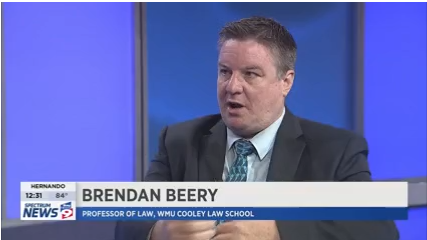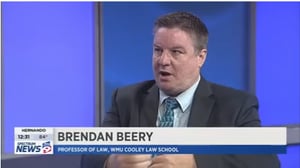Does the Revocation of Former CIA Chief's Security Clearance Raise Any Constitutional Issues?

 Blog author, Constitutional Law expert and Cooley Professor Brendan Beery explains why he feels Trump’s Revocation of Former CIA Chief’s Security Clearance may raise Constitutional Issues. Professor Beery, a summa cum laude graduate of the law school, teaches Constitutional Law, Criminal Law, and Criminal Procedure at Cooley Law School, and is a frequent legal expert in the media.
Blog author, Constitutional Law expert and Cooley Professor Brendan Beery explains why he feels Trump’s Revocation of Former CIA Chief’s Security Clearance may raise Constitutional Issues. Professor Beery, a summa cum laude graduate of the law school, teaches Constitutional Law, Criminal Law, and Criminal Procedure at Cooley Law School, and is a frequent legal expert in the media.
Constitutionally, let's start with the basics: The President has broad powers under Article II of the U.S. Constitution, both as the nation’s chief executive and as commander-in-chief of the armed forces. The consensus likely to emerge in coming days is that President Trump was within his authority to revoke the security clearance of former C.I.A. Director John Brennan, even if the President did so without going through normal protocols or consulting with his own director of national intelligence.
Some public intellectuals, Alan Dershowitz for instance, have suggested that there should be no limits on a president’s exercise of power, which he believes the Constitution explicitly or implicitly vests in him. Others disagree.
For instance, would it be okay for a president to take a bribe to pardon somebody who has done something illegal or wrong? Or could the President do something he’s authorized to do even if doing so would violate a citizen’s constitutional rights?
Put simply, an otherwise legal act may be done with the kind of intent that would render that act wrong or even illegal.
President Trump has done something that, at face value, is a legal act. But constitutional experts are asking the why question. It is clear that John Brennan has been a vocal critic of President Trump. Just the day before his clearance was revoked, he tweeted, directly to the President, his concerns about certain actions and behaviors he found "dangerous for our Nation.”
As the First Amendment says, any citizen is allowed to think—and to express his thoughts, without fear of reprisal from the government. The President is part of the government. This past May a federal judge sided with the Constitution and the First Amendment when he ruled that President Trump could not block twitter users from his account simply because he disagreed with others’ opinions and ideas.
Two principles undergird First-Amendment reasoning in federal cases: first, the more political speech is, the more protected it is; and second, the less popular and more controversial it is, the more protected it is. This makes sense. As the Supreme Court once noted, “[F]ew … would march our sons and daughters off to war to preserve the citizen’s right to [watch pornography in a theater.]”
We do, on the other hand, march our sons and daughters off to war to preserve our freedom to express ideas around such things as government, philosophy, and religion. We also don't need the First Amendment to march along a sidewalk with a sign proclaiming affection for Mom, apple pie, and Uncle Sam. We do need it when we take to the streets, the airwaves, or a social media platform to speak truth (or a perception of it) to power.
If the President stripped Brennan of his security clearance to punish Brennan for his controversial political dissension, then he might have violated the First Amendment, but that doesn’t mean a court would address the issue.
Federal courts historically have avoided issues that are 1) assigned to the other branches (the Congress or the President) by the text of the Constitution itself; 2) beyond the competence of the legal system to resolve; or 3) too hot for a court to handle, because it’s the subject of a fiery political fight. This case could involve all three of those categories of what courts call “political questions” (and therefore not legal questions).
First, the Constitution assigns matters involving the military, foreign affairs, and national security to both Congress (under Article I) and the President (under Article II). Second, there are no legal precedents involving a president using security clearances to even political scores. Third, a court may think it would embarrass the United States and its judiciary were judges to wade into these political waters—and rule that such questions would be better resolved by Congress, or by voters in the next election.
Courts may render the President to the judgment of the people, not judges.

